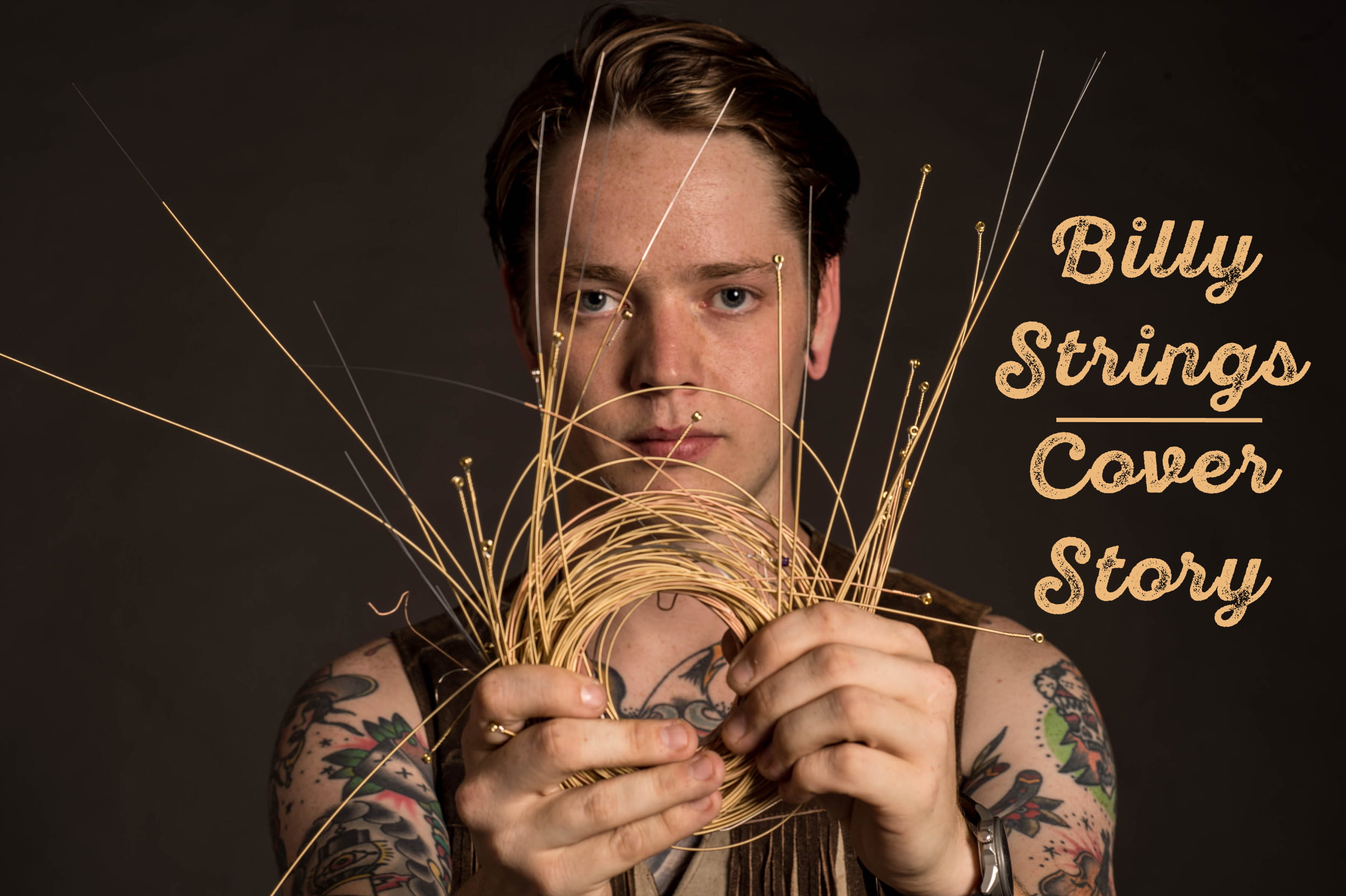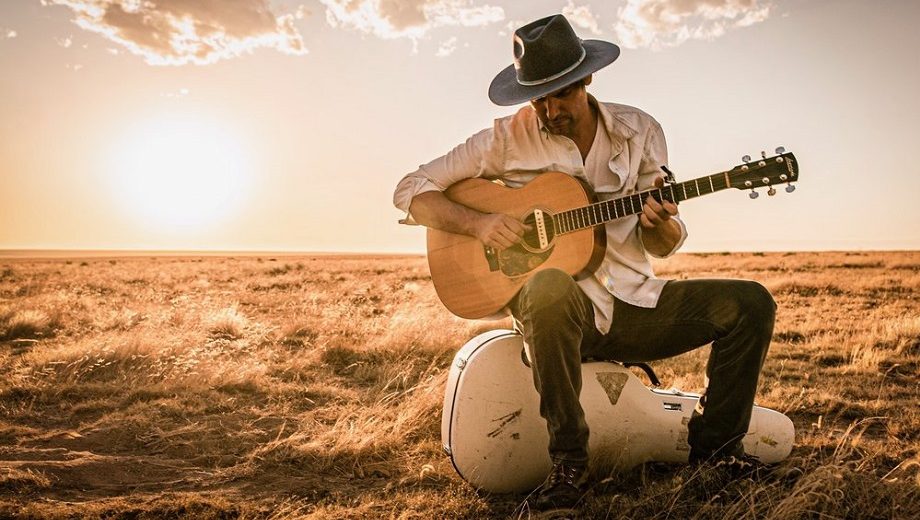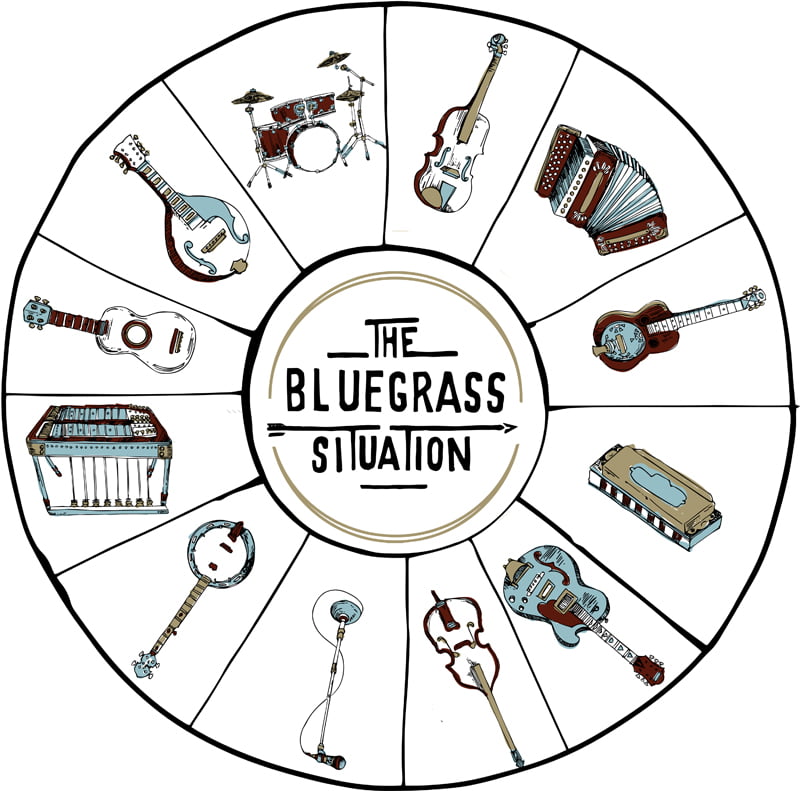Guitar virtuoso Billy Strings (born William Apostol) is on the road somewhere between here and there, when he picks up the phone. That question “Where exactly?” gives him pause. “The other day, I couldn’t remember where I was,” he admits, a note of earnestness betraying his 25 years of age. It’s that sweet natured tendency the young have to overshare. “It took me probably at least 40 or 50 seconds just to go, ‘Oh yeah.’ I don’t know if you’ve ever felt that before, but it’s a really strange thing.” It’s the kind of problem that comes with being a popular bluegrass musician, and one he’s forever adjusting to as he zips from city to city. “We were in the van once, and I literally asked the question, ‘Is this where we are?’” he says with a laugh, knowing the existential weight of his own seemingly ordinary question.
Billy’s ever-probing mind, technical proficiency, and weighted voice all suggest a much older player. He recently released his debut LP, Turmoil & Tinfoil, recorded with Greensky Bluegrass’s producer, Glenn Brown, in the dead of Michigan’s winter. Even in that setting, it burns with a feverish heat. “It was like being snowed in, like cabin fever,” Billy says about the session, which could explain the album’s bracing pace. As much as he nods to tradition on Turmoil & Tinfoil, he also playfully stretches the bounds of bluegrass via face-melting guitar phrasing (thanks to his abiding interest in heavy metal, classic rock, the blues, and more) and socially conscious songs. Both the wounded “Living Like an Animal” and the frustrated “Dealing Despair” pry into issues of personhood and community at a time when both seem more fractured than ever. What others have termed his “authenticity,” Billy chalks up to “honesty,” and it serves, in a way, as his battle cry. He’s not afraid to keep asking questions, big or small.
Just out of curiosity, how many back-up strings do you bring on tour, given your penchant for breaking them in your wilder fits of playing?
Nowadays, I actually have three guitars onstage with me. I have two Preston Thompsons on stage, and then I have a Roy Noble on stage with me, as well. Rarely do I get to the third one anymore, but there have been times where I’ll reach for the Roy Noble.
So would you say, then, that a particularly crazy night on stage is a Roy Noble night?
Yeah, I guess so. You could.
Tradition has long been a defining force within bluegrass. How have you navigated your way through it?
I grew up playing bluegrass music and traditional bluegrass music, and I have a deep passion for that, as well, but I like all kinds of music.
Right, I know you’re a big metal fan, specifically.
Yeah, I love some death metal and some rock ‘n’ roll and blues. I like all sorts of stuff. When I was younger, I was a little bit more closed-minded about a lot of things, whether it was “Why would you want to play bluegrass but not bluegrass?” This or that, you know? But eventually I got out of that shell, and I want to get so far away from that “This is bluegrass and this ain’t” as I can. It’s just music. I’m just trying to let myself be free with music.
I think that’s something that we’re seeing a lot from the younger generation, bringing all these influences into the genre.
Definitely. I think there will always be a hint of traditional bluegrass in my shows because that’s how I learned to play guitar. My ears were trained by “How Mountain Gals Can Love” and “Blue Moon of Kentucky” — that’s the music I cut my teeth on. You’ll always hear it, I think, but I’m also going to do whatever the song calls for. I used to be embarrassed to show anybody a song that I wrote, and I’m just trying to ditch that whole mentality. Who cares if a song is that or this, or if somebody likes it or they don’t? It’s the song.
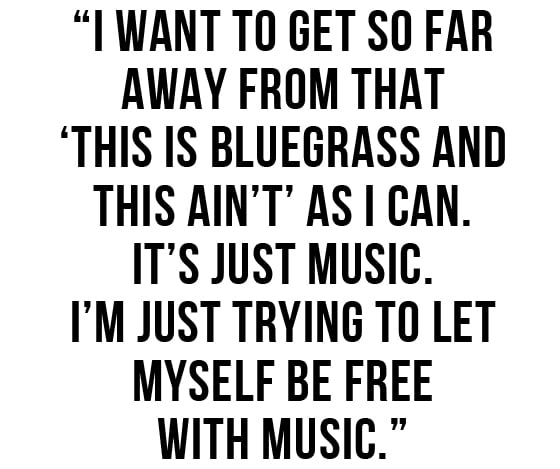
You’ve mentioned in the past that you’ve never learned anything note for note; instead, you just hear it and emulate it. What does your writing process look like, then, for original compositions?
It looks like me walking around my house with my guitar, staring at my reflection in the microwave. Pacing back and forth when nobody’s home, just scribbling on notebooks and stuff, and being on my Google Doc. I sit there with my guitar and I sing it and then, if I got something cool, I’ll write it down.
“Dealing Despair” is such a powerful original song in light of how divided the country seems. Where did that come from?
I actually wrote that quite a while back. It was after another unarmed Black man was shot down by police, and I was awfully pissed off. I was shook. I’m feeling it lately, too; there’s so much going on in the world.
It feels so divided. I mean, it always has been, but more than ever it seems.
Yeah, and we should just talk about music. But I’m feeling it lately, and you’ve gotta write about what you’re feeling, and that goes back to what I was saying about letting it happen and not worrying about if people are going to like it or not because certainly some people might take that song as a little aggressive.
I know some listeners keep clamoring for artists to shut up about politics and just be artists, but bluegrass has always been a space to sort through social issues.
Well, man, that’s folk music. Look at Woody Guthrie, Bob Dylan. You have to sing about that shit. You absolutely have to. It’s kind of our duty. I’m not going to punch anybody in the face. I’m not going to carry a gun. I’m not going to fight a war. But with my guitar, I will. All I have is my songs to fight back against the ugliness that’s out there.
But that fight exists as an “either/or” these days, and it can alienate certain listeners.
I want people that are loving and not cruel to each other to come to my shows. I really don’t care what anybody thinks. I’m just doing my thing.
Turning away from politics, your father also played on this album.
Yeah, he’s on the last track [“These Memories of You”].
I thought so! The harmonies have this interesting familial tone.
What you just said is a huge compliment to me. My voice sounds the best when it’s right next to his; I can’t sing with anybody like that. My dad didn’t even know that song. He just walked right into the studio, and I wrote the lyrics on a piece of paper, and he just did it. He knows how to follow me, and I know how to follow him. My dad is a seriously heartfelt musician. When he plays a song, he really means it. He’s not just saying the words.
You learned from him when you were younger, so what was that moment like in the studio?
He was so happy to be there. It was kind of like he was a little kid. He sits around the house and plays, but he rarely goes and plays on stage anywhere — let alone in a recording studio.
And look how the tables have turned.
Those moments are what I cherish the absolute most. For instance, when I was six or seven years old, I was learning “Beaumont Rag,” and I just played the rhythm, but I kept messing it up in this one part. Right in the middle of the song, I said, “Stop. Dad, why don’t you play it and let me listen?” I listened to what he was trying to say with the guitar, and I go, “Now, let me try it again,” and I nailed it. He started laughing. He reached over his guitar and squeezed my little hand. He called my grandmother and said, “Listen to your grandson right now!” I was a little kid, but I’ll never forget that moment. Now there have been several moments since then, like when I got to introduce my dad to David Grisman in real life because my dad introduced me to David Grisman when I was seven years old. We got to sing songs all night.
That is so wild.
Yeah, it is wild because we come from a tiny little town and it’s not always been easy, and our family has had a lot of crazy stuff. Those moments are super good for me because I feel like it’s that same thing: It brings me right back to when I got the “Beaumont Rag” right. It really pushes me, and there are all sorts of reasons that I’m doing this, but that’s a huge one — because mom and dad are proud. I’m so grateful that they turned me onto this music. My childhood was a lot of bluegrass. I’m so grateful for that because I love this music.
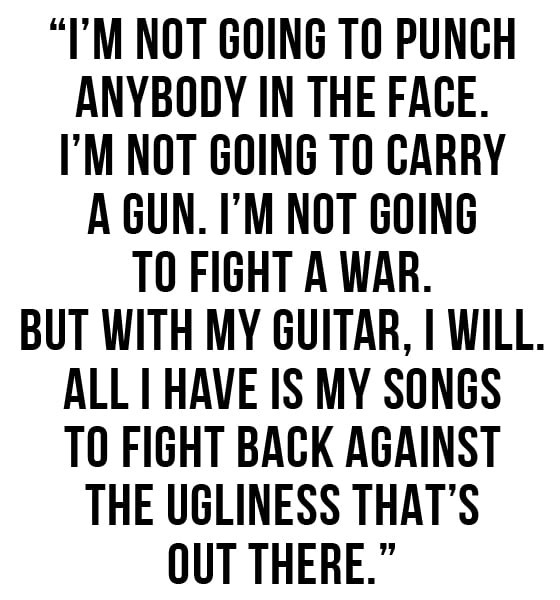
It’s interesting, too, because it seems like listeners are, in part, gravitating toward what they keep calling your authenticity. At 25 years old, that can be a loaded statement. How have you found your own way through that kind of praise?
I don’t know. I haven’t heard that word thrown around me that much.
Maybe not to your face.
Yeah, right. When I was talking about my songwriting, I’m just trying to do my thing and just be honest. Even in life. Don’t dip your toes in the water; just jump right into the deep end. Don’t get yourself into a situation that you don’t want to be in because you know what you really want. Don’t lie to yourself. Just be yourself.
You are wise beyond your years.
I think a lot, you know?
That comes across in your playing, too.
When I’m playing, it’s easy to learn a song and go through the routine and just play it night after night. But when I go out on stage, that’s not what I do. I try to actually pour it out with my guitar, from my heart. If you listen to a lot of the people I grew up listening to — Mac Wiseman, Bill Monroe, Larry Sparks, Keith Whitley — when they’re singing, they’re not kidding. That’s why you can cry when you hear it. I love players like that. And there’s so much music out there today, you know Top 40 everything, that’s garbage.
Well, it’s too constructed, but I can see how your dad shaped you to sing from the heart.
Every time he picks up the guitar, he does that.
What a great way to learn.
I also learned a lesson from Sam Bush without him saying anything. I leaned over and took a drink of my beer — this was quite a while ago — and I looked over at Sam Bush and he had his eyes closed playing the hell out of the rhythm. It’s like, “Why do I think that I can just stop playing the song right now to take a sip of beer? Wake up, kid. You’re playing a song. What are you doing?” It’s that attitude. Whenever those dudes play, Sam Bush gives it 110 percent. Bryan Sutton was telling me the other day that Doc would never pick up his guitar and just play a little ditty or half of a song; he would always play the whole song.
Speaking of Bryan, I know you collaborated on “Salty Sheep.” How did that come about?
I think I just called him and asked him. [Laughs] It was so amazing for me. We sat a microphone in between us, and we sat in two chairs really close to each other, just facing each other. With no headphones on, we just played the tune a couple times, and holy shit.
Well, talk about Doc Watson vibes.
Well, that’s what me and him geek out on. When we go to lunch, we’re always talking about Doc Watson. We both love him so much.
So we can expect a covers album from you two soon?
I have no idea. I’m down, but you’d have to ask Bryan. He’s such a wonderful friend and mentor. He’s done this 20 years, and he’s got a lot of advice for a young guy like me. I’m so grateful for that advice. He just gives it away for free because he’s a good friend and he cares about guitar and Doc’s legacy and all that. I’m honored to have him as a friend, and completely honored to have him on the record.
